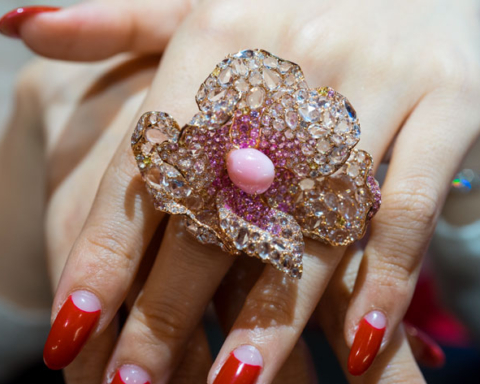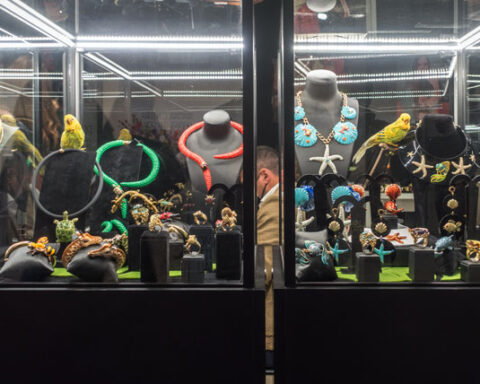«At the beginning of the 2011/2012 financial year, and more precisely on 21 April 2011, the Directors Guido Grassi Damiani, Giorgio Grassi Damiani and Silvia Maria Grassi Damiani voluntarily renounced the compensation for the 2011/2012 financial year approved by the Board of Administration pursuant to art. 2389, paragraph 3, of the civil code, in order to thus demonstrate, even more, one’s keen affection for the company”. In difficult times you need to give an unequivocal signal to the market. And as Bersani-Crozza would say: «Gentlemen, we are not here to polish the shells of mussels».In short, let’s not waste time and let it be known that the key shareholders are ready to give up their salary for the good of the company. Foresighted decision. Because already in spring 2011, with the Berlusconi government in full swing, the consumer crisis had knocked on the door of luxury companies. Which, contrary to what one might believe, are not immune to recession. This is demonstrated by the accounts of the goldsmith group listed on the Italian Stock Exchange, which had a difficult time in 2012, but not without difficulties. The company, however, remains healthy and proactive despite the persistence of the economic difficulties. Perhaps also thanks to the beau geste of its partners and managers.
The group. He is (almost) 90 years old, but he doesn’t look it. Damiani was founded in Valenza in 1924 by Enrico Grassi Damiani. It is he who began designing and producing jewelery for the noble families of the time and the rich bourgeois of the area. The goldsmith’s shop was inherited by Damiano Grassi Damiani, his son, who continued the family tradition. Damiani jewels have gained ever greater notoriety thanks also to the idea, innovative for that time, of guaranteeing the price to customers and creating catalogs with all the collections. In the 1980s, however, the carousel of faces of the star system began, testimonials for a company that was now projected onto international markets. Names like Isabella Rossellini, Brad Pitt, Nastassja Kinski, Chiara Mastroianni, Milla Jovovich, Jennifer Aniston, Gwyneth Paltrow, Sophia Loren or Sharon Stone have been (and still are) combinations that affirm the brand all over the world. Today the company, which has grown to become a multi-brand group, is led by the third generation of the Damianis. And he added high-end watches to the jewels. In addition to Damiani, the group includes the brands Calderoni 1840, Salvini, Alfieri & St. John, Bliss, as well as the licensed lines (such as Ferrari, Ducati and Maserati, Galliano Jewellery). The Rocca 1794 chain (over 200 years of history) specializes in the retail of watches and fine jewellery. But the Damiani Group is present in Italy and in the main world markets with 47 direct sales points located in the main Italian and international fashion streets. Since 2007 the group has been listed on the Piazza Affari list.
The bills. Damiani closes the financial statements on March 31st. The accounts, therefore, are staggered compared to the calendar year. During the financial year ending on 31 March 2012, the company achieved consolidated revenues of 151.6 million euros, with a negative ebitda (gross margin) of 4.3 million and an operating result (ebit) also with the minus sign for 7.4 million. The group’s net result was also in the red at 11.9 million euros. Given this, it may seem curious that the company points the finger at the measures of the Monti government, accused of depressing consumption, to justify its economic results. In short, even if 2011 (when Monti was not there) ended in the red, we certainly cannot point to the bogeyman of the Financial Police to explain the decline in sales. Yet this is what we read in the 2012 half-yearly accounts, closed on 30 September. «In the domestic market, however, the contraction in consumption and general uncertainty continue, resulting in a lower propensity for wholesale customers to purchase», we read in the financial statements for the half-year. «The contraction in consumption in Italy is also due to a climate of mistrust certainly not helped by the provision of the maximum limit of one thousand euros for cash payments imposed by the Government. For a sector like the luxury one, this ceiling slows down sales and undermines consumption. Added to this is also a generalized hostile attitude towards luxury goods which have been and still are a very important resource for the country and flag of Made in Italy”. The climate of hostility to luxury is undoubtedly real. But the reading of the income statement should be, let’s say, more detailed. A few lines earlier, in fact, it is explained that «in the half-year the Damiani mono-brand stores managed directly in Italy and abroad, following a trend that has been going on for some time now, continued to grow, recording an overall increase in revenues of 27.4%.












